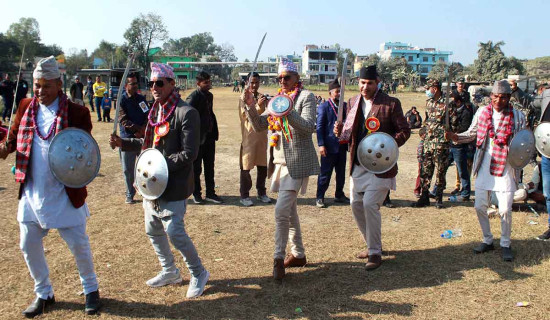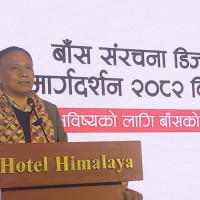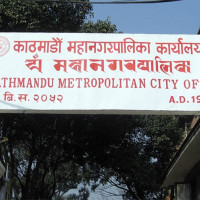- Friday, 19 December 2025
Leaders should be accountable to people: Bhusal
Pampha Bhusal is now the Vice Chairperson of the ruling CPN (Maoist Centre). Bhusal served as a minister twice leading the Ministry of Energy, Water Resources and Irrigation and the Ministry of Federal Affairs and General Administration.
Coinciding the Republic Day, she recently talked to consulting editor Upesh Maharjan & journalist Sapana Thami, at the Gorkhapatra Online, on different aspects of the republic system and constitution. TRN’s Sushma Maharjan translated the interview from Nepali. Excerpts:
What are the main achievements of the republic in 16 years?
The republic is a process where people become their masters, ending nepotism and favouritism and allowing them to choose their rulers based on their abilities, and interests through ballot papers. The republic set-up, established after ending nearly two and a half centuries of autocratic, patriarchal, dynasty-based rule, ensures equal status for every citizen and importance to each vote. It is a system where decisions are made based on the people's votes.
After the declaration of the republic, we drafted and promulgated a constitution, which decentralised the Kathmandu-centric government into seven provinces with a total of 753 local levels. This system believes in proportional inclusiveness and ensures representation and leadership for women, Dalits, indigenous nationalities, Muslims and other minorities deprived of rights and opportunities. We are practising this.
The republic has guaranteed fundamental rights such as education, health, employment, food sovereignty and housing for the Nepalis. Around 16 laws have been enacted regarding these rights, and we are currently in the implementation phase.
It has fundamentally followed social justice. It is a system which allows women to reach the highest state bodies. It ensures a minimum of 33 per cent representation for women in policymaking and more than 40 per cent representation at the local levels. It is a new system that also brings marginalised groups and communities into policy-making and implementation levels.
Therefore, the children of ordinary people can also lead the nation, make policies and work at government bodies including administration, security agencies and the judiciaries.
It is a process that transforms the era of the country. It has ensured equal rights for women by establishing equal property rights and ending patriarchy. Therefore, the republic is an epoch-making change.
How do you view the implementation aspects of the constitution under this system?
Since the promulgation of the constitution, two elections have been held at the federal, provincial and local levels. These bodies are implementing the constitution within their jurisdictions. By the second term, the experience, capacity, and knowledge have matured somewhat. However, there has been a delay in the formulation of some laws. Although these laws were said to be formulated rapidly it has not happened yet. The system does not allow the provincial and local governments to formulate laws until they are formulated by the federal government for them. This has hindered the desired progress. Despite the formulation of laws in accordance with the constitutional provisions, some minor issues are still obstructing its full implementation.
As we are entering the 17th year of the republic, we aim to complete these tasks within a year. Along with addressing remaining republic-related responsibilities, we will also reach a new phase. We have reached a situation where amendments to some issues directed and provisioned by the constitution are to be made.
We have seen the parliament session today and yesterday. This might create political instability. Such instabilities could be created from two perspectives; an attempt to prevent institutionalisation of changes and some conditional situations. We adopted an inclusive electoral system to represent communities and groups deprived of opportunities. Later, we introduced a mixed electoral system—the first-past-the-post and proportional representation electoral system of 60 and 40. This electoral system prevents a single party's dominance in parliament, necessitating coalition governments and potentially leading to instability.
Additionally, we have made a threshold of 3 per cent. We need to discuss and reform this issue as the threshold could create more parties and it would become a bargaining chip.
However, the republican system has not provided political stability. A republic will not be a republic if we do not create a basis where the executive head serves for five years or create a situation for forming a majority government through the House of Representatives by adopting only the first-past-the-post election system.
What role should constitutional bodies and people's representatives play in the current situation?
Their role should be accountable to the people. We have assigned the executive, and legislature to fulfill the responsibilities given to them by the people. But, I feel like the judiciary is not playing its role as effectively as it should resulting delays in resolving many problems, issues and cases. Additionally, the people’s representatives should develop their capabilities as per their roles. Either the electoral system or executive heads should visit the provincial and federal levels.
Regarding the governance structure and electoral system, a political debate is needed. The constitution amendment should be done by a two-thirds of majority instead of the majority.
If instability persists, it will not align with the spirit of a federal democratic republic and political stability will be unattainable. The people's expectations for economic prosperity and social justice require at least a stable government for five years. A significant portion of the country's workforce is emigrating due to unemployment, but that workforce is needed within the country. Providing employment and various economic development opportunities within the country requires political stability, which is a significant challenge.
What role should the major political parties play in maintaining political stability?
The top leadership should prepare their party's policies and programmes and direct the country. All major parties of the country are currently in the parliament. This should make everyone aware of their responsibilities. There are some disagreements between the political leaders, and they must be discussed.
Those who were together to launch the political movement to usher in the republic system in the country should again come together to implement and safeguard the constitution. I am hopeful the party leaders will once again accomplish this task.
What role should the state play in ensuring fundamental rights in remote areas as well?
Currently, citizens are the supreme power of the nation. Citizens exercise their voting rights at every level and their chosen representatives are now the highest bodies. Therefore, I don't think people from remote/village areas are deprived of their fundamental rights. It is also duties of people to know about their rights and responsibilities.
I feel that there is a lack of awareness about duties. There is more criticism, less responsibility, and a strong demand for rights, but duties are not being fulfilled, and everyone is solely focused on the government. I feel like people think less about what they can do for the country according to their interests, abilities and capacities. Citizens should be patriotic and contribute to the country. The government cannot develop the country on its own. The government is indeed the guardian, the policymaker and the guide but every citizen must play their part. If some rights are not fully realised, there should be efforts to raise awareness.
With the development of social media, science, technology and IT, there arises a challenge that these mediums tend to spread negativity and depression leading people far from their responsibilities instead of bringing out truth and facts. The media should play a role in creating public awareness by highlighting the shortcomings and providing objective, fact-based information to cultivate a positive public opinion. Currently, society tends to depict more negativity and less positivity.





-square-thumb.jpg)



-original-thumb.jpg)







